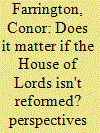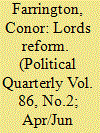| Srl | Item |
| 1 |
ID:
168756


|
|
|
|
|
| Summary/Abstract |
Anthems are conventionally viewed as helping to unify and mobilise populations by generating a sense of shared identity. Beethoven's Ode to Joy, which currently serves as the European anthem, occupies a more equivocal place in the European Union's symbolic armoury. Whether performed with or without Schiller's original text, the piece raises important questions regarding the nature of the European Union and the purpose of Beethoven's music within contemporary European politics. Nevertheless, given that any practical alternatives also raise significant difficulties, Beethoven's Ode to Joy can be regarded as a useful prompt for reasoned discussions regarding the future of the European Union, especially if reunited with the text of Schiller's An die Freude.
|
|
|
|
|
|
|
|
|
|
|
|
|
|
|
|
| 2 |
ID:
117498


|
|
|
|
|
| Publication |
2012.
|
| Summary/Abstract |
In May 2011 the Coalition government published a draft bill for reform of the House of Lords, proposing an upper chamber composed of 80% elected and 20% appointed members serving for single 15-year terms. These plans reflect aspects of the stated positions of the main political parties, votes in the House of Commons, and broader political and scholarly debates over the past decade. Nevertheless, there is significant opposition from across the political spectrum, and there is a significant possibility that the proposed reforms will not be enacted before the next general election. This article draws on the views of participants (including three current peers) in a Symposium at Trinity Hall, Cambridge to argue that the likely failure of the reforms may be less disastrous than many suppose. Especially since the 1999 reforms, the House of Lords is in many ways a more active and legitimate chamber than is commonly realised.
|
|
|
|
|
|
|
|
|
|
|
|
|
|
|
|
| 3 |
ID:
138888


|
|
|
|
|
| Summary/Abstract |
The failure of the Coalition government's attempt to reform the House of Lords has by no means taken further reform off the political agenda. The commitment to installing an elected upper chamber is still widely shared across the political spectrum, on the basis of perceptions that the House of Lords lacks democratic legitimacy. Against this view, this article considers recent literature upon non-electoral representation, deliberative democracy and bicameralism, which together highlight the possibility of an unelected second chamber playing a legitimate role within a wider (democratic) system of government. The article then considers the House of Lords from this perspective, reflecting on changes in the upper chamber since the 1999 reforms and evaluating its role within the wider political system. The paper concludes by suggesting that political debate should focus upon small-scale reforms to ensure that the Lords becomes more effective, representative and legitimate, within the constraints of its present role.
|
|
|
|
|
|
|
|
|
|
|
|
|
|
|
|